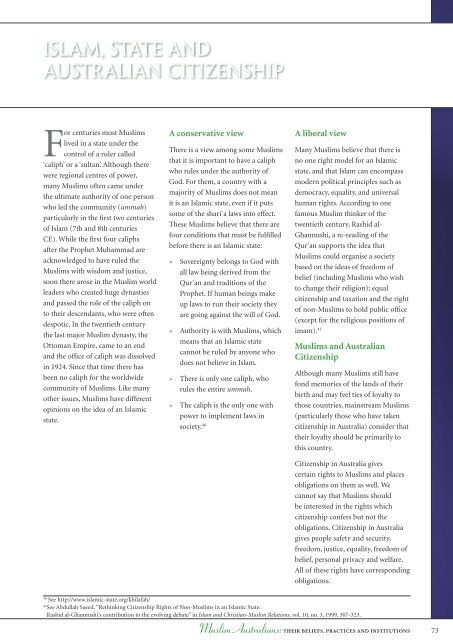Muslim Australians - Religion Cultural Diversity Resource Manual
http://www.islamicglobe.com
http://www.islamicglobe.com
You also want an ePaper? Increase the reach of your titles
YUMPU automatically turns print PDFs into web optimized ePapers that Google loves.
ISLAM, STATE AND<br />
AUSTRALIAN CITIZENSHIP<br />
For centuries most <strong>Muslim</strong>s<br />
lived in a state under the<br />
control of a ruler called<br />
‘caliph’ or a ‘sultan’. Although there<br />
were regional centres of power,<br />
many <strong>Muslim</strong>s often came under<br />
the ultimate authority of one person<br />
who led the community (ummah)<br />
particularly in the first two centuries<br />
of Islam (7th and 8th centuries<br />
CE). While the first four caliphs<br />
after the Prophet Muhammad are<br />
acknowledged to have ruled the<br />
<strong>Muslim</strong>s with wisdom and justice,<br />
soon there arose in the <strong>Muslim</strong> world<br />
leaders who created huge dynasties<br />
and passed the role of the caliph on<br />
to their descendants, who were often<br />
despotic. In the twentieth century<br />
the last major <strong>Muslim</strong> dynasty, the<br />
Ottoman Empire, came to an end<br />
and the office of caliph was dissolved<br />
in 1924. Since that time there has<br />
been no caliph for the worldwide<br />
community of <strong>Muslim</strong>s. Like many<br />
other issues, <strong>Muslim</strong>s have different<br />
opinions on the idea of an Islamic<br />
state.<br />
A conservative view<br />
There is a view among some <strong>Muslim</strong>s<br />
that it is important to have a caliph<br />
who rules under the authority of<br />
God. For them, a country with a<br />
majority of <strong>Muslim</strong>s does not mean<br />
it is an Islamic state, even if it puts<br />
some of the shari`a laws into effect.<br />
These <strong>Muslim</strong>s believe that there are<br />
four conditions that must be fulfilled<br />
before there is an Islamic state:<br />
» Sovereignty belongs to God with<br />
all law being derived from the<br />
Qur’an and traditions of the<br />
Prophet. If human beings make<br />
up laws to run their society they<br />
are going against the will of God.<br />
» Authority is with <strong>Muslim</strong>s, which<br />
means that an Islamic state<br />
cannot be ruled by anyone who<br />
does not believe in Islam.<br />
» There is only one caliph, who<br />
rules the entire ummah.<br />
» The caliph is the only one with<br />
power to implement laws in<br />
society. 40<br />
A liberal view<br />
Many <strong>Muslim</strong>s believe that there is<br />
no one right model for an Islamic<br />
state, and that Islam can encompass<br />
modern political principles such as<br />
democracy, equality, and universal<br />
human rights. According to one<br />
famous <strong>Muslim</strong> thinker of the<br />
twentieth century, Rashid al-<br />
Ghannushi, a re-reading of the<br />
Qur’an supports the idea that<br />
<strong>Muslim</strong>s could organise a society<br />
based on the ideas of freedom of<br />
belief (including <strong>Muslim</strong>s who wish<br />
to change their religion); equal<br />
citizenship and taxation and the right<br />
of non-<strong>Muslim</strong>s to hold public office<br />
(except for the religious positions of<br />
imam). 41<br />
<strong>Muslim</strong>s and Australian<br />
Citizenship<br />
Although many <strong>Muslim</strong>s still have<br />
fond memories of the lands of their<br />
birth and may feel ties of loyalty to<br />
those countries, mainstream <strong>Muslim</strong>s<br />
(particularly those who have taken<br />
citizenship in Australia) consider that<br />
their loyalty should be primarily to<br />
this country.<br />
Citizenship in Australia gives<br />
certain rights to <strong>Muslim</strong>s and places<br />
obligations on them as well. We<br />
cannot say that <strong>Muslim</strong>s should<br />
be interested in the rights which<br />
citizenship confers but not the<br />
obligations. Citizenship in Australia<br />
gives people safety and security,<br />
freedom, justice, equality, freedom of<br />
belief, personal privacy and welfare.<br />
All of these rights have corresponding<br />
obligations.<br />
40<br />
See http://www.islamic-state.org/khilafah/<br />
41<br />
See Abdullah Saeed, “Rethinking Citizenship Rights of Non-<strong>Muslim</strong>s in an Islamic State:<br />
Rashid al-Ghannushi’s contribution to the evolving debate” in Islam and Christian-<strong>Muslim</strong> Relations, vol. 10, no. 3, 1999, 307-323.<br />
<strong>Muslim</strong> <strong>Australians</strong>:THEIR BELIEFS, PRACTICES AND INSTITUTIONS 73














